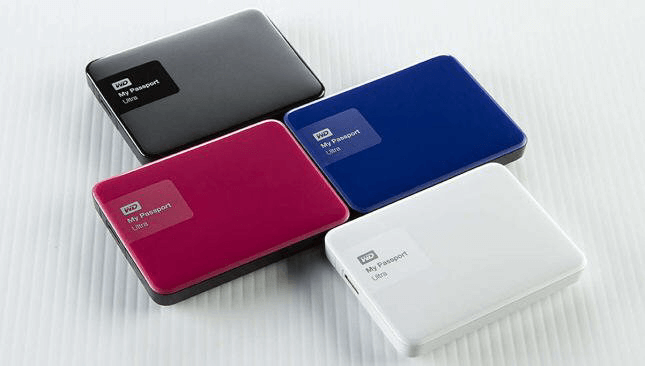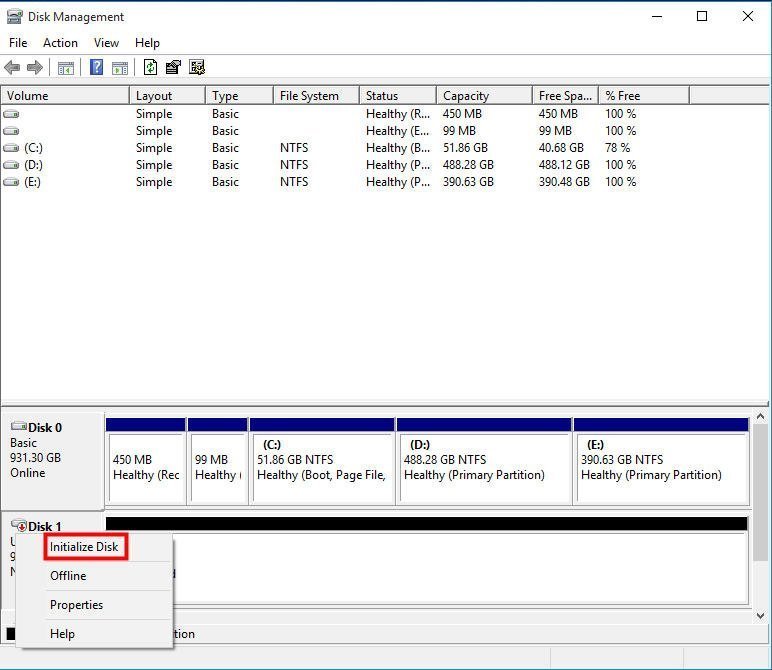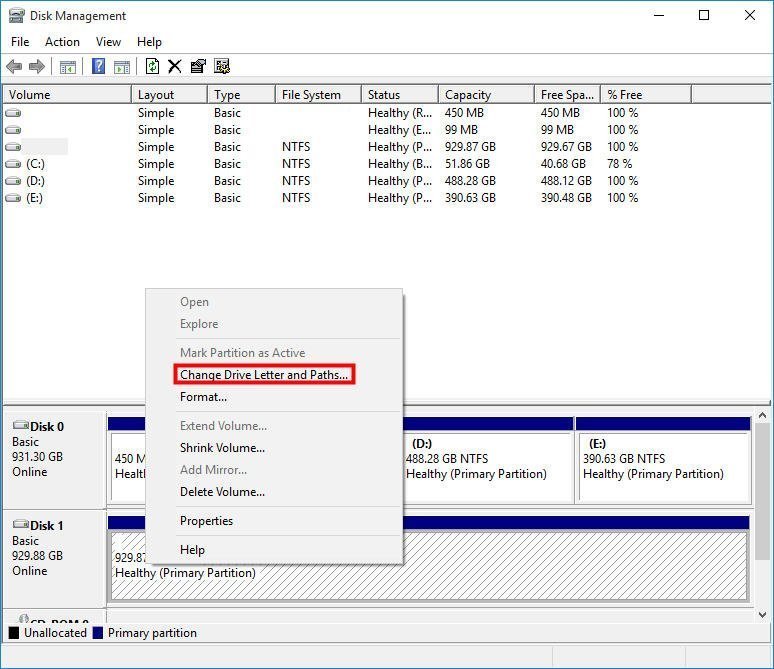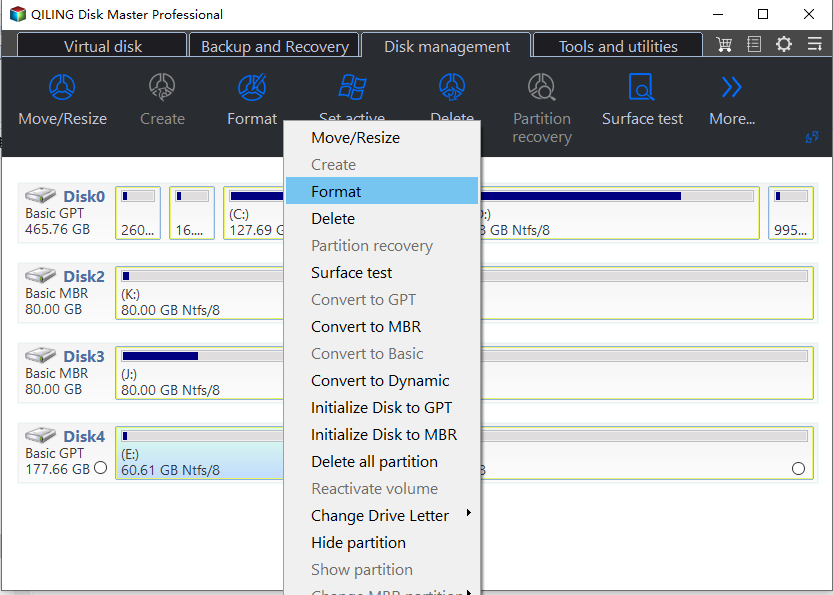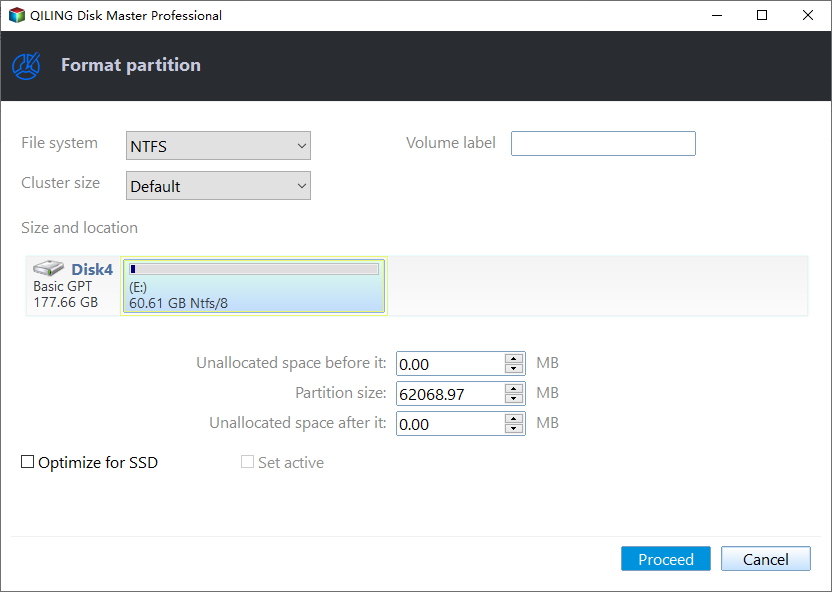How to Solve My WD Hard Drive Not Recognized in Windows 10 Or 11
- My WD hard drive not recognized in Windows 10
- Different solutions under different situations
- ▶ Method 1: Initialize WD hard drive in Disk Management
- ▶ Method 2: Assign drive letter to WD hard drive partition
- ▶ Method 3: Format WD hard drive to a compatible file system
- ▶ Methods 4: Update WD hard drive device driver
- ▶ Method 5: Enable USB device in BIOS
- ▶ Method 6: Switch connection port
- Conclusion
My WD hard drive not recognized in Windows 10
I have a Western Digital 1TB Elements Portable external hard drive, which used to work well with my friend's computer. However, I found that WD Elements not showing in my computer File Explorer after I connected it to my computer running Windows 10. That is to say, I am unable to access my WD hard drive from File Explorer. But I would like to use it to store some files. Is there anyone who encountered a similar issue? Can you give me some advice? Thanks for your help!"
Different solutions under different situations
In fact, it is not rare that computer users are bothered by WD hard drive not being recognized in Windows 10 issues, which can be caused by various events like incompatible file system, invalid USB port, outdated driver, and so on. You can take the measures described in the following text to enable your WD hard drive to show up properly in Windows 10/11 File Explorer.
▶ Method 1: Initialize WD hard drive in Disk Management
This way applied to the situation that your WD hard drive shows as not initialized disk when you open Disk Management. Follow the steps below:
1. Locate the WD hard drive that going to be initialized and right-click it.
2. Choose "Initialize Disk" and pick one partition system between MBR and GPT.
3. Right-click the disk and choose "Create New Simple Volume".
Then, you can do what New Simple Volume Wizard prompts.
PS:
»Initializing WD hard drive will lead to data loss. If you don't care about the data on WD hard drive, you can apply this way.
»It is possible that you are unable to initialize hard drive and receive errors like the device is not ready.
▶ Method 2: Assign drive letter to WD hard drive partition
WD external hard drive not showing up in Windows 10/11 File Explorer could be the result of drive letter missing or conflict. If your hard drive is in such a case, you can assign drive letter to it or change its drive letter.
1. Open Disk Management in Windows 10/11.
2. Right-click the hard drive partition and choose "Change Drive Letter and Path…"
3. In the pop-up window, click on "Add" to assign a drive letter to the hard drive partition or click "Change" to change the drive letter.
4. Close Disk Management and access hard drive from Windows 10/11 File Explorer.
▶ Method 3: Format WD hard drive to a compatible file system
You can employ this way if your WD hard drive was previously formatted with an unrecognized file system under windows or there are corrupted files on it. You are certain to format WD hard drive using Disk Management. However, this Windows built-in tool is with some limits. For instance, it is unable to format hard drive partition over 32GB in size to FAT32 file system.
Therefore, it is recommended to apply the powerful disk formatting tool – Qiling Disk Master Standard, which breaks the limit of 32GB in partition size and offers you more options about file system. It is compatible with Windows 11/10/8.1/8/7, XP, and Vista. To format WD hard drive in Windows Server, you can use Qiling Disk Master Server.
In the beginning, you can free download this great software.
Then, do the step-by-step tutorial given below.
1. Install and fire up Qiling Disk Master. In the main interface, right-click the hard drive partition that needs formatting and choose "Format Partition".
2. Choose a proper file system for WD hard drive (Here NTFS is selected).
3. Return to the main interface. Confirm formatting operation and click "Proceed" to perform it.
PS: Qiling Disk Master is not only compatible with Windows 10, but also with Windows 11/8.1/8/7, XP, and Vista.
▶ Methods 4: Update WD hard drive device driver
If your WD hard drive is even not showing up in Windows 10 or Windows 11 Disk Management, you could consider whether there is something wrong with the WD hard drive device driver. Press "Windows + R", input "devmgmt.msc", and hit "Enter" to open Device Manager.
Click disk drives and check if there is a yellow exclamation mark with WD hard drive disk device. If it is, right-click WD hard drive, choose "Properties" and click Update Driver under Driver tab or click on "Uninstall". Then, you can restart computer to see whether the WD external hard drive is recognized by Windows 10/11.
▶ Method 5: Enable USB device in BIOS
WD hard drive not detected or working in Windows 11/10 might be caused by disabling USB interface in BIOS as well. In such a case, you can enter BIOS settings to enable USB device. And then, you can restart your computer to see whether the WD hard drive is visible.
▶ Method 6: Switch connection port
When the connection port is dead or damaged, you will not see WD hard drive in Windows 10 or 11. To check whether the USB port is OK, you can unplug WD hard drive and connect it to another USB port to see if it is able to be recognized by Win 10/11.
Conclusion
Find out the most possible events, causing WD hard drive not recognized in Windows 10/11, take responding measures based on a specific situation, and you'll be able to fix this problem quickly and securely.
